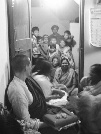|
|






Nun of the Slum
A NUN’S STORY
What’s ‘happy’?
I think in our culture we are taught to think that happiness will come in the future: ‘You’ll be happy when you get good marks and finish school.’ ‘You’ll be happy when you find your soul mate.’ ‘You’ll be happy when you get your dream job or dream car.’ It’s always in the future, never in the now.
We also feel ashamed to admit that we’re not really happy. Our billboards depict so-called happy families in their shiny cars, and new homes. But we never see that dad has a drinking problem, mum is exhausted because she’s working full time to pay off a huge mortgage, and that the kids talk more on their phones than to each other. I’m not saying everybody is like this, but I think we’re all striving for a dream we haven’t questioned.
Is this it?
When I was young I too believed that I would find happiness in clothes, toys and food. But after my older siblings moved out, I felt lonely and bored. My father also had cancer, which filled me with uncertainty. I had so many toys. Although I didn’t (yet) know the meaning of hunger or loss, I was constantly wanting and never satisfied.
When my father died, I cracked up. I felt suicidal and depressed and started to question the meaning of life. This wasn’t mere wondering; the question screamed at me. So at 15, I left home and went searching. I was a hippie for a while; I travelled, tried relationships, drugs, different lifestyles, and although I experienced momentary happiness, it soon faded.
Finding Buddha
I discovered Buddhism and meditation at age 17 while travelling in Nepal. Somehow all the questions I had were answered and for the first time I felt a freedom, peace, stability and deep happiness that had eluded me my whole life.
This came from cleaning out all the useless negative thinking and emotions, the endless mental chatter, and abiding in the luminous space that was left – not a blank and impersonal space, but one of the big heart that recognises its interconnectedness with all beings and can love and respond skilfully to the world’s suffering.
From that time on, I devoted myself to meditation and study. I was deeply impressed by how stoic and happy Himalayan people were, despite landslides, poverty, freezing weather and in the case of the Tibetans – the loss of their country. I thought ‘I come from a country where we have everything yet few of us are content, but they have so little and are happy.’
Their secret was they lived in the present, in life as it arose in each vivid moment, without demanding it be otherwise. Eventually through my own meditation practice, I came to want less and was content just to be. I saw with a new clarity and freshness, noticing the beauty and sacredness in each moment, without needing to hold on. I felt peace.
Bodhichitta – a mind totally dedicated to others
When I was 23 I ordained as a Buddhist nun. Four years later, I was back in India and
committed to helping improve the local people’s lives.
I learned about the Dalits, (previously known as ‘untouchables’) who were made to do the most demeaning work and had been virtual slaves for thousands of years. They converted to Buddhism to escape the oppression of the Hindu caste system, which had stigmatised and marginalised them. These people were ready for change and passionate about social justice. It was like fire to dry tinder; they were so easy to help
For the past five years, I have been living in Nagpur, a city in central India, home to several hundred thousand Dalits and other extremely poor communities. It’s 47 degrees Celsius in summer and sometimes the pollution is so bad we don’t know if it’s overcast or sunny.
Not long after arriving in Nagpur, I started Bodhicitta Foundation, a grassroots charity that provides education, employment, medical workshops, counselling, nutritional advice and other services to men, women and children. We also offer Buddhist pastoral care to those who are already Buddhist, and no, we don’t convert!
The work is rewarding. I find that living for others is the best way for me to keep alive the Buddhist ideal of compassion. This and my spiritual practice are what give my life meaning. If I died tomorrow I’d have absolutely no regrets.
What’s ‘happy’?
I think in our culture we are taught to think that happiness will come in the future: ‘You’ll be happy when you get good marks and finish school.’ ‘You’ll be happy when you find your soul mate.’ ‘You’ll be happy when you get your dream job or dream car.’ It’s always in the future, never in the now.
We also feel ashamed to admit that we’re not really happy. Our billboards depict so-called happy families in their shiny cars, and new homes. But we never see that dad has a drinking problem, mum is exhausted because she’s working full time to pay off a huge mortgage, and that the kids talk more on their phones than to each other. I’m not saying everybody is like this, but I think we’re all striving for a dream we haven’t questioned.
Is this it?
When I was young I too believed that I would find happiness in clothes, toys and food. But after my older siblings moved out, I felt lonely and bored. My father also had cancer, which filled me with uncertainty. I had so many toys. Although I didn’t (yet) know the meaning of hunger or loss, I was constantly wanting and never satisfied.
When my father died, I cracked up. I felt suicidal and depressed and started to question the meaning of life. This wasn’t mere wondering; the question screamed at me. So at 15, I left home and went searching. I was a hippie for a while; I travelled, tried relationships, drugs, different lifestyles, and although I experienced momentary happiness, it soon faded.
Finding Buddha
I discovered Buddhism and meditation at age 17 while travelling in Nepal. Somehow all the questions I had were answered and for the first time I felt a freedom, peace, stability and deep happiness that had eluded me my whole life.
This came from cleaning out all the useless negative thinking and emotions, the endless mental chatter, and abiding in the luminous space that was left – not a blank and impersonal space, but one of the big heart that recognises its interconnectedness with all beings and can love and respond skilfully to the world’s suffering.
From that time on, I devoted myself to meditation and study. I was deeply impressed by how stoic and happy Himalayan people were, despite landslides, poverty, freezing weather and in the case of the Tibetans – the loss of their country. I thought ‘I come from a country where we have everything yet few of us are content, but they have so little and are happy.’
Their secret was they lived in the present, in life as it arose in each vivid moment, without demanding it be otherwise. Eventually through my own meditation practice, I came to want less and was content just to be. I saw with a new clarity and freshness, noticing the beauty and sacredness in each moment, without needing to hold on. I felt peace.
Bodhichitta – a mind totally dedicated to others
When I was 23 I ordained as a Buddhist nun. Four years later, I was back in India and
committed to helping improve the local people’s lives.
I learned about the Dalits, (previously known as ‘untouchables’) who were made to do the most demeaning work and had been virtual slaves for thousands of years. They converted to Buddhism to escape the oppression of the Hindu caste system, which had stigmatised and marginalised them. These people were ready for change and passionate about social justice. It was like fire to dry tinder; they were so easy to help
For the past five years, I have been living in Nagpur, a city in central India, home to several hundred thousand Dalits and other extremely poor communities. It’s 47 degrees Celsius in summer and sometimes the pollution is so bad we don’t know if it’s overcast or sunny.
Not long after arriving in Nagpur, I started Bodhicitta Foundation, a grassroots charity that provides education, employment, medical workshops, counselling, nutritional advice and other services to men, women and children. We also offer Buddhist pastoral care to those who are already Buddhist, and no, we don’t convert!
The work is rewarding. I find that living for others is the best way for me to keep alive the Buddhist ideal of compassion. This and my spiritual practice are what give my life meaning. If I died tomorrow I’d have absolutely no regrets.
Bodhicitta Foundation
Taking Light into the Dark Places of the World












